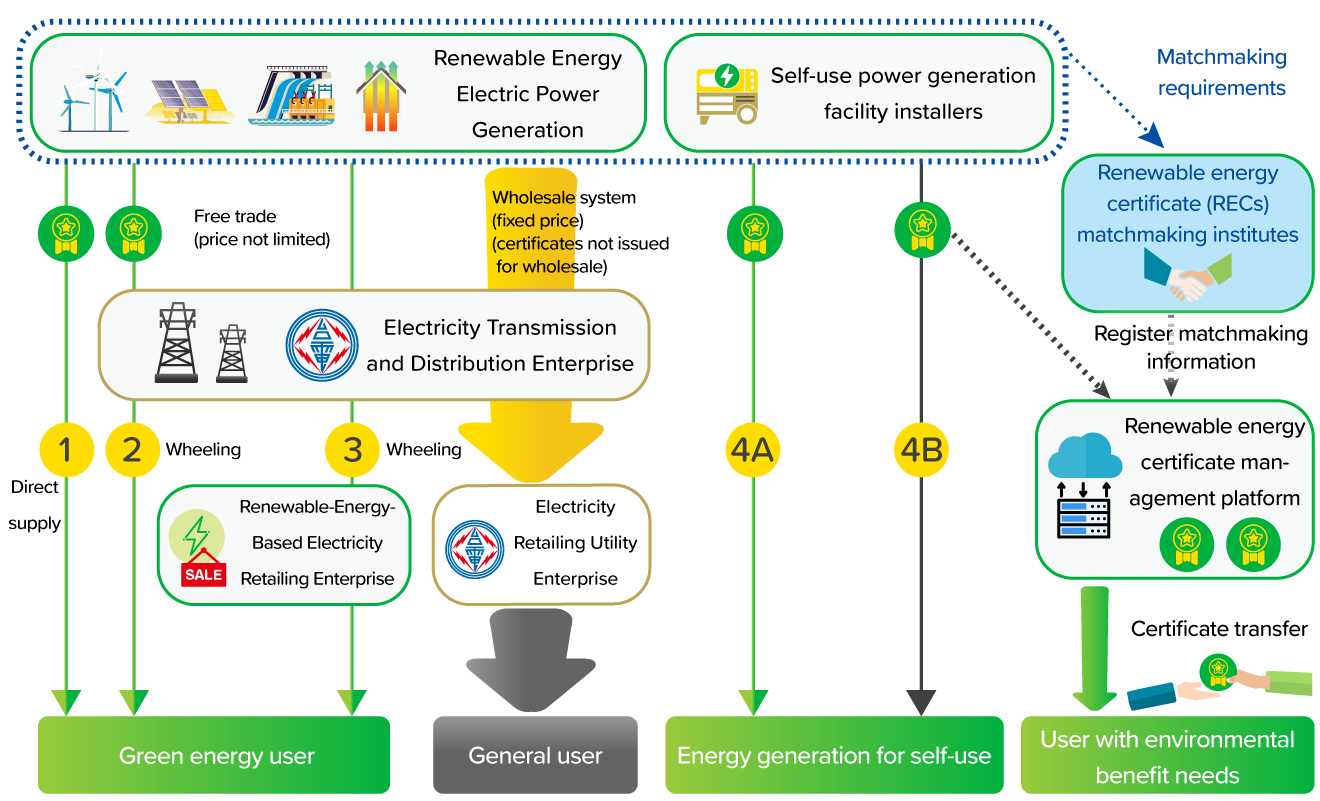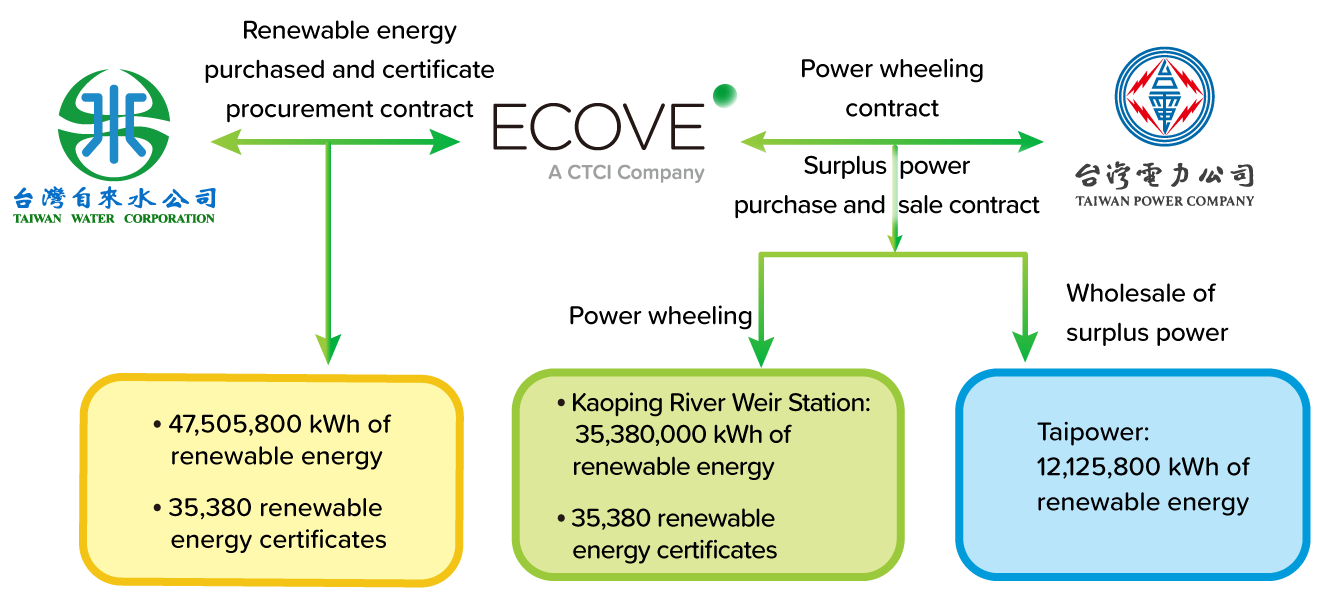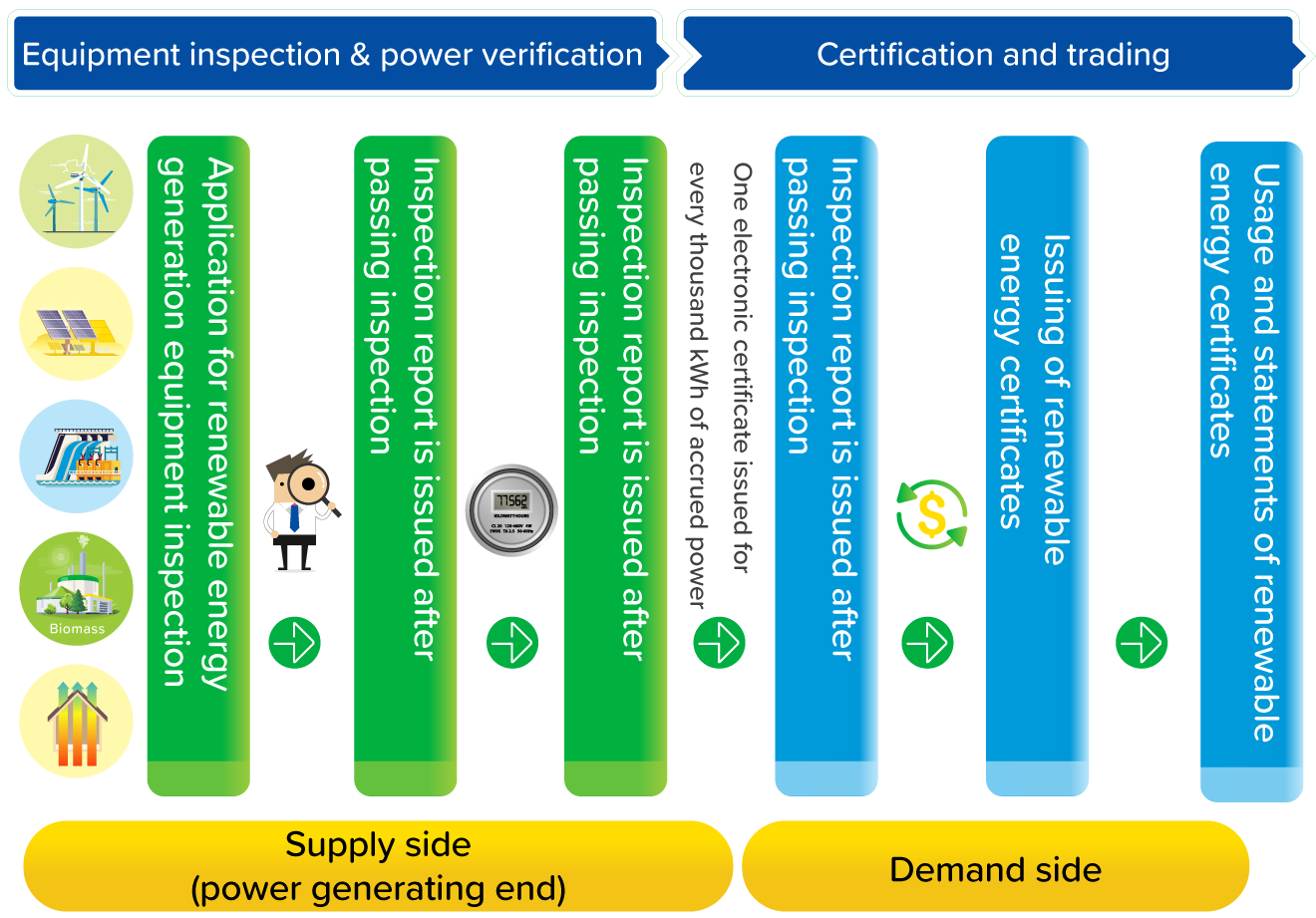Innovation
企業創新
Facilitating Green Power Trading with One-Stop Solar Power Service
ECOVE Solar Energy Corporation, a subsidiary of ECOVE Environment Corporation (hereinafter referred to as ECOVE), has long been cultivating a presence in the solar photovoltaic power industry and has extensive experience in the construction of solar power plants both in Taiwan and abroad. Faced with green energy commitments of companies, carbon reduction efforts of large power users, and a trend toward electricity liberalization, a large demand for green energy have been created. On that account, ECOVE has recently secured a contract from Taiwan Water Corporation with track records in electricity transmission and distribution services via grid installation (wheeling) from subsidiary ECOVE Solvent Recycling Corporation, and Chung-Hua Institution for Economic Research, building a one-stop service model for investment, development, construction, operation, and green power trading. In this article, we would explore the domestic renewable green energy trading model with an example from the Taiwan Water Corporation’s “Fengshan River Water Reclamation Plant” power transmission and distribution project.
Policies Prioritizing Green Energy Create Business Opportunities in Electricity Liberalization
With the promotion of energy transformation and policies prioritizing green energy in Taiwan, amendments to the Electricity Act focusing on the structure of the electricity market and reform to the management structure were passed in January 2017. This was the greatest amendment of the Act in 50 years, allowing renewable energy generation companies to freely choose to sell power directly to users or to the Taiwan Power Company (Taipower), breaking with the tradition of Taipower being the sole electricity seller, and created free trade opportunities for renewable energy. Furthermore, according to the policy of the Bureau of Energy, Ministry of Economic Affairs in 2021, large power users with regular contracted capacity of more than 5 MW shall complete installation of renewable energy generation equipment for 10% of the contracted capacity or install energy storage equipment, purchase renewable power and certificates, or pay monetary substitution to the competent authority for the development of renewable energy to fulfill their responsibilities. These policies, along with the international trend in carbon reduction, have caused a significant growth in the demand for green energy.
Renewable Energy Trading Model and Certification Mechanism
Power generated by power generation equipment, whether it is gray or green power, enters the Taipower transmission grid and will be incorporated. Users are unable to differentiate between the two types of power. In response to the large demand for green energy by corporations and certify that the power used is green power, the Bureau of Standards, Metrology, and Inspection (BSMI), Ministry of Economic Affairs, launched the renewable energy certification mechanism. Issuing and management of renewable energy certificates, which act as identification or a resume for green energy, are in charge by The National Renewable Energy Certification Center (T-REC Center). When a renewable energy company generates 1,000 kWh of electricity, the purchaser can apply for a certificate as proof of their green energy adoption. According to the real-time information by BSMI, 1.5 million renewable energy certificates had been issued as of September 2022, and the market demand continues to grow. The renewable energy trading model and certification mechanism are as follows: I.Sell to companies: Trading is conducted through the signing of power sales contracts or the Green Power Certificate Trading Platform. Renewable energy is sold to companies with green energy needs. Then, when companies purchase or use power, they will obtain renewable energy certificates. The trading model is divided into three categories: Direct supply, wheeling (electricity transmission and distribution via grid installation), and renewable-energy-based electricity retailing enterprise.
- Renewable energy companies directly supply green power to companies (Pathway 1 in figure below)
- Renewable energy companies transfer the green energy to companies through the Taipower grid (Pathway 2 in figure below). Fengshan River Water Reclamation Plant project has adopted this model.
- Renewable-energy-based electricity generating enterprise sell green energy to retailing enterprises which supply the green energy to companies through retailing enterprises and Taipower (Pathway 3 in figure below).
II.Wholesale to Taipower: The government provides preferential FIT (feed-in tariff) power prices and guarantees purchasing for 20 years. In addition, the acts clearly state that renewable energy certificates cannot be obtained for electrical power already sold to Taipower at wholesale. III.Generation for in-house use: The Taipower electricity price is relatively lower, so generation of green energy for in-house use (Pathway 4A in figure below) is not economical. Therefore, there are not many examples. If the installer of renewable energy power generation facilities chooses this option and has no need for renewable energy certificates, it can sell the certificates obtained to companies or customers in need (Pathway 4B in figure below).

Renewable energy and operation models of the certificate market (source: Bureau of Standards, Metrology, and Inspection)
Renewable Energy Wheeling Contracting Model—The Best Solution for Heavy Power Users
Given the current global trend toward emission reductions, ECOVE assisted the Taiwan Water Corporation in fulfilling social responsibilities as a heavy power user for solar power generation equipment investment, installation, and 20 years of operation and maintenance in Fengshan River Water Reclamation Plant project. The power generated will be wheeled and directly supplied to affiliated agencies for use, and assistance will be provided for the acquisition of renewable energy certificates. Fengshan River Water Reclamation Plant project is the first government project in Taiwan to be tendered through power wheeling model. Unlike the business model of leasing rooftop and land for installation of solar power facilities, for which one receives rebate funds for power generated, benefits created by ECOVE for Taiwan Water Corporation include directly wheeling power to Kaoping River Weir Station for use through the Taipower grid, fulfilling the obligations and responsibilities of heavy power users in one attempt and solving future green power insufficiencies. The preferential prices can provide stable power sources and green power certificate usage rights. The client is also exempted from one-time capital expenditures and investments in 20-year maintenance and management. According to the contract, solar power generation equipment with a minimum capacity of 1,900 kW shall be installed, including a wheeling capacity of 1,415 kW and surplus capacity of 485 kW. The estimated amount of power generated over 20 years will be 47,505,800 kWh (the annual power generation per kW of solar photovoltaic is 1,250). The power usage model is as follows:
- Wheeling capacity: According to the provisions for heavy power users, the wheeling capacity is 10% of the Kaoping River Weir Station contract, which is 1,415 kW. The total generated power over 20 years will be 35,380,000 kWh.
- Surplus capacity: The 485 kW of surplus power is sold to Taipower. The total generated power over 20 years will be 12,150,000 kWh.
The contract structure, estimated power purchased, and number of certificates for the project are shown in the figure below.

Contract structure, estimated power purchased, and number of certificates.
According to the contract, the application for renewable energy certificates will be submitted by ECOVE (installer), which shall accommodate on-site inspection operations. After application has been accepted, the power generation data shall be registered on the T-REC Center platform; for every thousand kWh of power generated, BSMI will issue one certificate.

Application process for renewable energy certificates (source: Bureau of Standards, Metrology, and Inspection)
Conclusion
The development of solar photovoltaics plays an important part in global energy transition. ECOVE is one of the few companies in Taiwan to provide one-stop service model for investment, development, construction, operation, and green energy trading, with total developed solar power capacity at home and abroad of 142 MW and the capacity of maintenance projects over 350 MW. In terms of energy storage, ECOVE helps the government stabilize power supply through energy storage system projects and ancillary services; in terms of green power trading, ECOVE has established cooperation with the government and civilian organizations. With our vision being “to become the most reliable provider of industry-leading ‘resource cycling’ services,“ ECOVE will continue to provide services required by customers with green energy needs, and jointly achieve the goal of net zero emissions.

